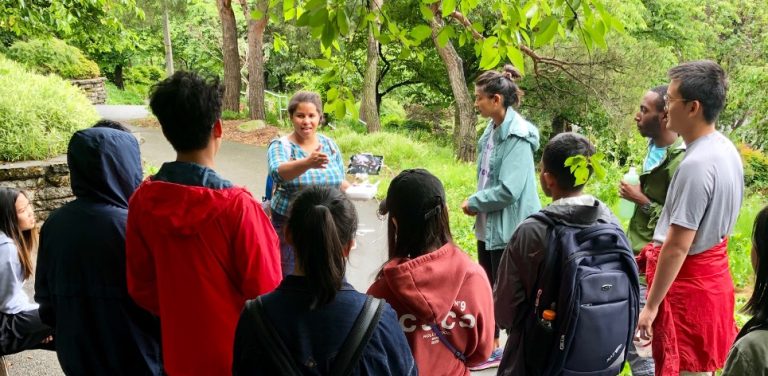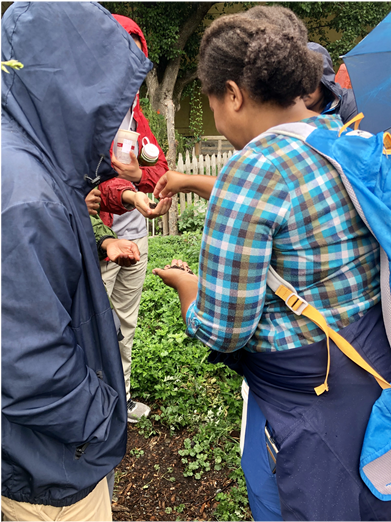Published on February 18, 2023

This is the second in a series of interviews from Urban@UW highlighting the research of urban scholars at the University of Washington. Urban@UW spoke to Melanie Malone, Assistant Professor in the School of Interdisciplinary Arts and Sciences at the University of Washington Bothell. The interview has been edited for length and clarity.
What do you do at the University of Washington?
I work on the University of Washington Bothell campus, and I am an assistant professor in the School of Interdisciplinary Arts and Sciences.
My background is in geomorphology and soil science and my career has kind of gone a few different interdisciplinary ways. At one point I worked as an environmental geologist at a consulting firm looking at contaminants in soil and water in all these different places around Portland, Oregon. And that got me really interested in the ways that contaminants impact people. So even though I was trained more in geology and soils and looking at the way contaminants move through those things, I’m also really interested in how contaminants impact people that are coming into contact with them.
I also teach spatial analysis and GIS, environmental justice, and a few different types of geography classes like critical physical geography, which is what I consider my current field. It’s a very interdisciplinary field focused on power, and how power informs research questions, but also shapes landscapes, and a lot of different things that have to do with social justice and physical science and the way they intersect.
Can you tell us about your research?
I have a few different things in the works. One is a project I’ve been working on basically since I’ve been here at UW Bothell. I started in 2018, and then in the spring of 2019 I started a project on contamination and urban community gardens in the Seattle area, but I also have a colleague that I work on this with in New York, and so I look at some samples from there as well. And that project actually started with the critical physical geography class that I teach here on the Bothell campus, and students were involved at the beginning, and we do lots of research on not just the contaminants in people’s soils that they may encounter, but also understanding what concerns they have about contaminants in their spaces. A lot of the gardeners and farmers that are in the spaces don’t know about contamination, or what it means to have contamination in their garden spaces. So a lot of the research is centered around telling people about it and trying to make people safer.
And I always start the project and say that we don’t want people to stop farming or gardening. It’s really important as a connection to land, especially for people that have been historically removed and disenfranchised from connections with land, and oftentimes these are people of color. So farming and gardening is a way for people to connect with land, but we also don’t want people to be hurt by the land. So there’s a lot of sampling, lab work, interviews, surveys, and all that with those folks.

Dr. Melanie Malone and UW students work with youth to sample soils and garden produce.
Another one of my urban projects is near the Lower Duwamish Superfund site. I recently was awarded an EPA Star Grant on climate change and environmental justice with some other co-PIs on the Seattle campus, and that project is looking at contamination in water, soil and sediment in the Puget Creek Watershed, near the Lower Duwamish Superfund site. What we’re looking at in particular are areas that have not been paid attention to well near the Superfund, which is a really toxic place. It’s been on the Environmental Protection Agency’s superfund list for years and a variety of different technical agencies have worked on the Lower Duwamish Superfund, but there’s still a lot of community concern about areas that haven’t been cleaned up well, or areas that people are still concerned about for a variety of reasons.
One thing in particular that we want to focus on in this grant is access to water, and how people encounter water in the watershed. Recently there was a huge flooding event, and both the South Park and Georgetown neighborhoods which are near the Lower Duwamish Superfund site were flooded. And so people’s homes were flooded with a variety of waters that came from the river, and that unfortunately also included waters that came out of the combined sewer overflows. So beyond potentially contaminated water from the river, they also had to worry about sewage. We took some samples of the water there and we’ll be doing a lot of water and sediment sampling and also looking at the places that people specifically are concerned about.
What are some challenges that you face in your research?
I think that with climate change it’s always difficult, right? Climate change makes every environmental problem worse. It doesn’t really matter what you’re talking about, whether it’s floods or disease or urban heat islands. All of that is made worse by climate change. And so I think it’s a really fascinating topic in many ways, because it does touch our lives in so many different ways. It also impacts all my research projects that I just talked about. I am really, really interested in what the communities I work with are concerned about and I always learn a lot from them.
And there are things that happen to them that don’t happen to me, so I like to listen and think through what they’re saying. I like to think about the questions that they have, which are honestly research questions, and investigate those with them. So I think that climate change, because it does touch all of our lives no matter what race you’re from, or what background or class you’re from, everybody has something to say about it, and so it always makes for interesting discussions and interesting research projects.
What has surprised you most about your research?
In my urban garden project, I wasn’t surprised that there was contamination in the gardening spaces, because some of those sites were near the Superfund site, and then we have ongoing pollution from air, from old uses of properties, and so forth, so that doesn’t surprise me. But you know, on the Lower Duwamish project, the flooding that happened there wasn’t modeled to happen for another 25 years. And so again, climate change is here. We did not expect so soon after we got this grant to be out sampling for potential contaminants at the community’s request. So that was a big surprise.
The flooding was brought to our attention by BJ Cummings, who works at the UW Edge Center and she is one of the co-founders of the Duwamish River Community Coalition. And she has been a wonderful community advocate for the Superfund site. I just want to highlight BJ and all of her work.
How do your teaching and your research interact?
They’re very, very intertwined. The urban garden project started with a class that I was teaching, and it was great because the students were really invested, and they wanted to learn how to sample, and they got lab skills, and they also learned how to talk with people from a variety of different cultures in respectful ways.
One of the goals I always have in my research, especially when I’m teaching and having my students interact with communities, is that they’re getting both STEM skill sets and social science skill sets that will be useful for them in the future.
For the community garden project, I involve the critical physical geography class, and then every summer I employ students that are both from here at UW or UWB and other programs or the communities that are involved in research. And then in my other classes, I often bring research in, or take my students to places that I work with around Seattle. So I bring my research into the classroom, but my classroom also goes out into my research.
That’s great that your students have so many opportunities to engage in your research. If you could give aspiring urban scholars a piece of advice, what would it be?
Really late in my graduate career I was introduced to the concepts of ontology and epistemology, which are basically how people know things and why people know things. And I really wish that I had had more courses just on that topic because with the projects I do now, especially on the STEM side of things, people have a very specific way that they are going about research. So for me, that would have been really helpful to have alongside learning how to do various scientific methodologies. I think a lot is taken for granted in the sciences, and science is useful, and I am primarily a physical scientist and really enjoy doing it. But I think that a lot of questions around power and the types of questions that are asked are really interesting, because it definitely shapes the research. And so oftentimes the interpretation of what you’re collecting, or how you’re doing it, is very subjective. And so I would say learning how and why people do what they do in research would be my advice to folks that are coming up and doing any sort of research.
What is something coming up that you are excited for?
I’m looking forward to this summer because summer in the Pacific Northwest is always amazing. We have the best secret about our weather. So I’m looking forward to that, and being out and doing research and working with the community.
Edited by Logan Bridge for Urban@UW